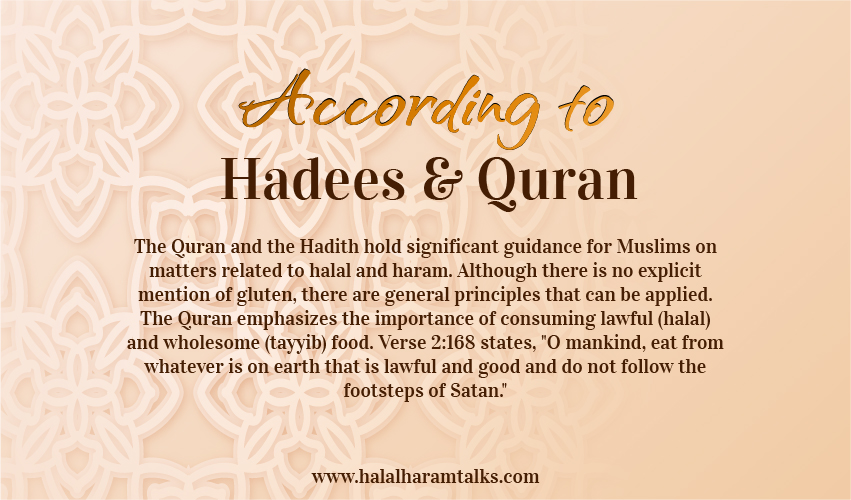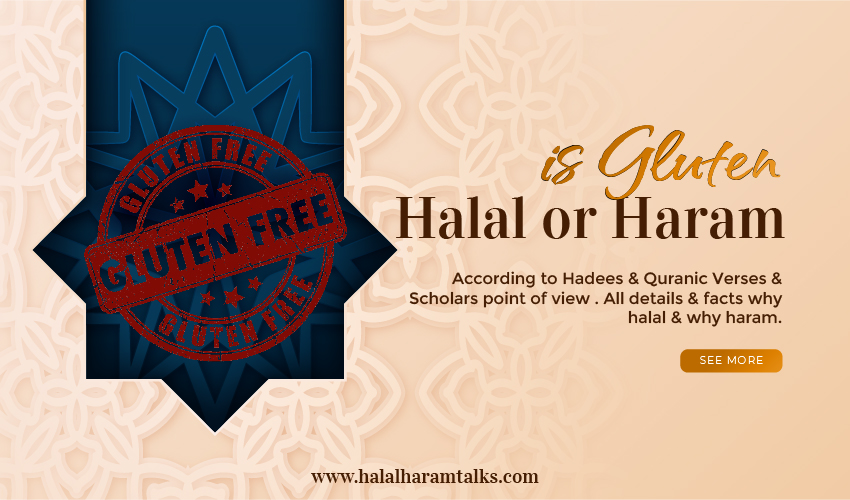Gluten, a protein found in grains such as wheat, barley, rye, and oats, has become a topic of discussion among Muslims regarding its halal status. In Islamic dietary practices, adhering to halal guidelines is of utmost importance. Halal refers to food and drinks that are permissible according to Islamic law, while haram denotes what is forbidden.
The question of whether gluten is halal or haram arises due to concerns about its source, processing, and possible cross-contamination with non-halal substances. Muslims strive to ensure that their dietary choices align with their religious beliefs and principles.
Hence, understanding the halal status of gluten is crucial for those seeking to maintain a halal lifestyle. In this article, we will delve into the complexities surrounding the halal status of gluten, exploring scriptural evidence, common misconceptions, and guidelines to help Muslims make informed decisions regarding gluten consumption.
Is Gluten Halal?
Gluten is a protein found in wheat and other grains such as barley, rye, and oats, which gives elasticity to dough, helping it rise and maintain its shape. The question of whether gluten is halal or haram is a common concern among Muslims, as adhering to halal dietary practices is an important aspect of their faith. In this article, we will explore the topic of whether gluten is halal or haram and provide detailed explanations supported by Quranic verses, Hadiths (sayings of Prophet Muhammad), and relevant information.
For more: Is Whey Protein Halal
Why Is Gluten Halal Or Haram?
Determining whether gluten is halal or haram depends on various factors. It is important to consider the source of the gluten and how it is processed. The main concern arises from the possibility of cross-contamination with haram (forbidden) ingredients, particularly when it comes to grains such as wheat, where gluten is naturally present. It is crucial to ensure that gluten-containing products comply with Islamic dietary guidelines.
Quran Verse & Hadith about to Is Gluten Halal
The Quran and the Hadith hold significant guidance for Muslims on matters related to halal and haram. Although there is no explicit mention of gluten, there are general principles that can be applied. The Quran emphasizes the importance of consuming lawful (halal) and wholesome (tayyib) food. Verse 2:168 states, “O mankind, eat from whatever is on earth that is lawful and good and do not follow the footsteps of Satan.”
The Hadith also provides guidance on halal practices. Prophet Muhammad (peace be upon him) emphasized the importance of seeking knowledge and clarifying any doubts regarding what is halal. He said, “The lawful is clear and the unlawful is clear, and between them are matters that are doubtful which many people do not know. So he who guards against doubtful things keeps his religion and honor blameless…” (Sahih Muslim).
While itself it is not explicitly mentioned, these verses and Hadiths underline the significance of consuming only that which is known to be lawful and wholesome, highlighting the need for Muslims to research and understand the halal status of it and related products.
For more: How Many Pages Are In The Quran

Is Gluten Free Halal?
Gluten-free products have gained traction in recent years, catering to individuals with gluten intolerance or celiac disease. These products are typically made with alternative flours or ingredients that do not contain gluten. While gluten-free products themselves do not inherently guarantee halal status, they might be more suitable for individuals seeking to avoid it due to religious reasons. To ensure gluten-free products are halal, it is necessary to read ingredient labels and verify that no haram ingredients or cross-contaminations are present.
For more: Is Bacon Halal
Is Gluten in Chocolate Halal?
Chocolate, a beloved indulgence for many, may contain gluten depending on its ingredients and manufacturing process. Some chocolates use wheat or barley derivatives as additives, while others may be manufactured in facilities that process gluten-containing products, leading to potential cross-contamination. Muslims should carefully read the ingredient labels or look for halal-certified chocolates to ensure they are gluten-free and comply with Islamic dietary guidelines.
For more: Is Chocolate Halal
Is Wheat Gluten Halal or Haram?
The question of whether wheat gluten is halal or haram largely depends on its source and processing. Wheat is one of the primary its grains, and its halal status depends on the cultivation methods, harvesting, processing, and whether any haram substances have been added. It is essential for Muslims to seek information regarding the source and processing of wheat gluten to ensure its compliance with Islamic dietary guidelines.
For more: Is Vinegar Halal
Is Beef Gluten Halal?
Beef itself is halal, as long as it complies with Islamic slaughter techniques. However, if beef is processed or marinated using its ingredients, such as sauces or seasonings containing wheat derivatives, it may no longer be considered halal. It is crucial for Muslims to be cautious and confirm that the beef, including any additives or marinades, is free from haram ingredients and cross-contamination.
For more: Is Subway Halal
Proof of Is Gluten Halal or Haram
Determining the halal or haram status of it requires comprehensive research and knowledge of Islamic dietary guidelines. Scholars and halal-certifying organizations play a vital role in examining the sources, ingredients, and manufacturing processes of gluten-containing products. By certifying products as halal, they provide assurance to Muslims that the items meet the necessary requirements.
Moreover, it is essential for individuals to educate themselves about halal practices and consult trusted sources before consuming its products. This can include reading ingredient labels, seeking halal certifications, and contacting manufacturers for further information.
For more: Is Turkey Halal
FAQs
No, not all gluten is haram. The halal or haram status of it depends on factors such as the source of it, its processing, and the presence of any haram ingredients or cross-contamination. It is important to carefully examine the ingredients and manufacturing processes to determine the halal status of its products.
While gluten-free products are generally suitable for individuals seeking to avoid them due to health reasons, it is still advisable for Muslims to check the halal status of such products. Gluten-free does not automatically imply halal. Muslims should read ingredient labels and look for halal certifications to ensure the products comply with Islamic dietary guidelines.
Yes, there are halal certifications available for food products, including those that contain it. Halal certifying organizations thoroughly examine the ingredients, processing, and facilities to ensure compliance with Islamic dietary guidelines. Look for halal certification logos or symbols on packaging to identify products that have been certified as halal.
Yes, individuals with intolerance or celiac disease can simultaneously follow halal dietary practices. While their primary concern may be avoiding its products for health reasons, they can also ensure that the gluten-free products they consume comply with halal requirements. By opting for halal-certified gluten-free products, they can align their dietary choices with both health needs and religious beliefs.
Conclusion
Determining the halal or haram status of it requires careful consideration of its source, processing, and potential cross-contamination. Muslims are encouraged to seek knowledge, consult scholars, and rely on halal-certifying organizations to ensure their dietary choices comply with Islamic guidelines. It is crucial to read ingredient labels, verify halal certifications, and contact manufacturers if any doubts or concerns arise.
To explore more about halal and haram practices, visit our website, where you will find comprehensive information and resources. Understanding what is halal and haram empowers individuals to make informed choices and enriches their connection to their faith. Let us embark on this journey together to ensure that our dietary practices align with our religious beliefs and values.
